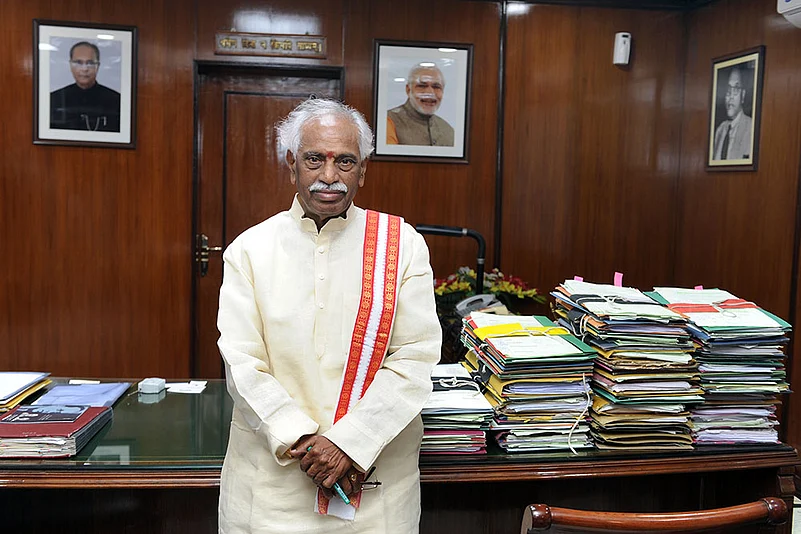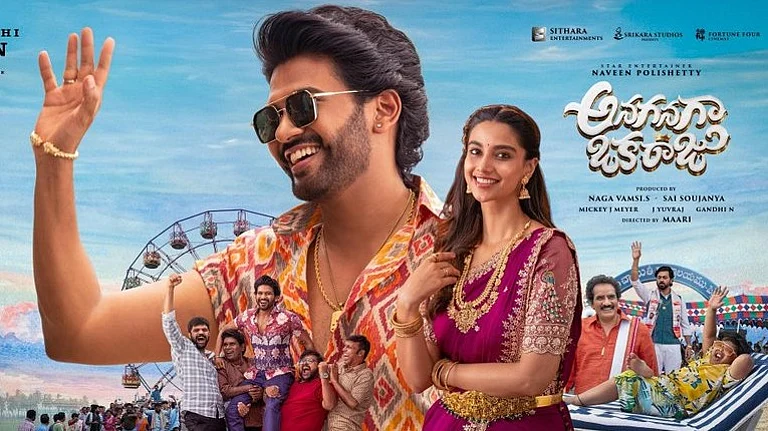Labour minister Bandaru Dattatreya has been in the line of fire from trade unions and political critics for the proposed wide-ranging reforms in labour laws. Now, the government has given unions a greater role in consultations, he says in an interview with Pragya Singh:
Is Make-in-India slowing down as a result of unions raising objections to labour reform?
Actually, no. Make in India, a flagship program started by the prime minister along with Skill India and Digital India, are geared to create employment. The growth rate, as we can see, is increasing. This means, money is going into some industry, that some establishments are coming up.
Yet, companies say they lack manpower to fill vacancies, while unemployment is also rising...
India has got a large technical-manpower requirement. When you look for someone to work who is technically skilled, you won't find anybody. That is the situation. In India, hardly 4 or 5 per cent are skilled, whereas in Germany, 80 per cent, in Japan 90 per cent and in Korea nearly all are skilled. Compared with them, India has a tremendous skill gap.
What is your assessment of the jobs situation, long term?
By 2022, we believe, India will need 10 crore jobs. So you need a technically trained workforce. Even our carpenters, construction workers, welders and electricians should become highly skilled. At present 93 per cent of workers have no skills at all.
So your challenge is a large base of workers without skills and industry that demands skilled workers?
You see, this means that the numbers of job seekers is increasing every year, but unable to enter the workforce.
What is the government doing about it?
This time in the budget, Rs.1600 crore is being provided for skills development. Another 1000 crore is being invested into an employment generation programme, the Pradhan Mantri Rozgar Yojana.
How does this fit into the proposed labour reforms?
At one end, the labour reforms are geared to simplify and rationalise procedure. Right now a company has to seek, say, eight certificates from eight departmental windows. We want one step instead of eight. Secondly, we are creating a unified online platform for job-seekers and employers, so that jobs are easy to find. Legal reforms are the third step. Here, four central laws are being framed to merge existing labour laws into separate, simplified, codes.
Why is the government doing this?
Some of our labour laws date back to 1920s and 1930s. Also, we have 44 labour-related laws. We believe that the labour laws should be in tune with today's environment, which is very different from the 1920s. The law should also be simpler and less cumbersome.
What is wrong with the present laws?
For instance, every Act defines each aspect of labour law differently. "Wages", for instance, is defined one way in the Payment of Bonus Act, another way in the Minimum Wages rules and so on. Similarly, "Trade Union", "Employee", "Employer", all are defined in different ways across laws.
The criticism is that the laws are employee-unfriendly.
That is incorrect. So far, no final decision has been taken, but consider lockouts and retrenchment. The unions have put forward certain demands, but the fact is, at present establishments do face close-downs. And, workers are being retrenched with payments of 15 days wages. We are saying, this should go up to 45 days, which is an employee-friendly step. You have to see the situation at present; in any case a factory or establishment in question is closing down. What can be done in such a situation? We can give more wages to these workers, for one. Suppose the factory closes down, the best way out for the workers is to get the most they can.
Yet, the unions heartily disagree.
Nowhere, in any part of the reforms of labour laws will the workers rights go away. They will be protected, and that is our prime job. Take another instance, that of working hours. We want the employees to be able to work more, to earn more, so we give them opportunity to work for overtime that is higher. Basically, we will do everything in our power to put more wages into their hands. Now if the unions say they want a minimum wage of 25,000, the employer says they will have to shut down as a result. So nothing is settled so far, we are doing the tripartite discussions and we will find a way through consensus.
The contract workers of India are an insecure lot...
For contract workers we want payments credited directly into bank accounts, we want them to have a wage guarantee as well.
There have been conflicts between contract and regular employees over terms and conditions. Take Maruti and Honda cases and Haryana and Rajasthan recently. What can the government do to resolve this?
The company and the workers should try and resolve disputes through discussion. There is an issue here, where the centre cannot interfere in state matters arbitrarily. The division of duties between the centre and state is such that the states must resolve matters internally. The disputes between companies and workers also need to be settled by them through discussion.
So your government is committed to labour law reform.
We are not just committed, we keep in mind the three priorities, in this order -- nation first, then worker, then industry.
A shorter, edited version of this appears in print


























